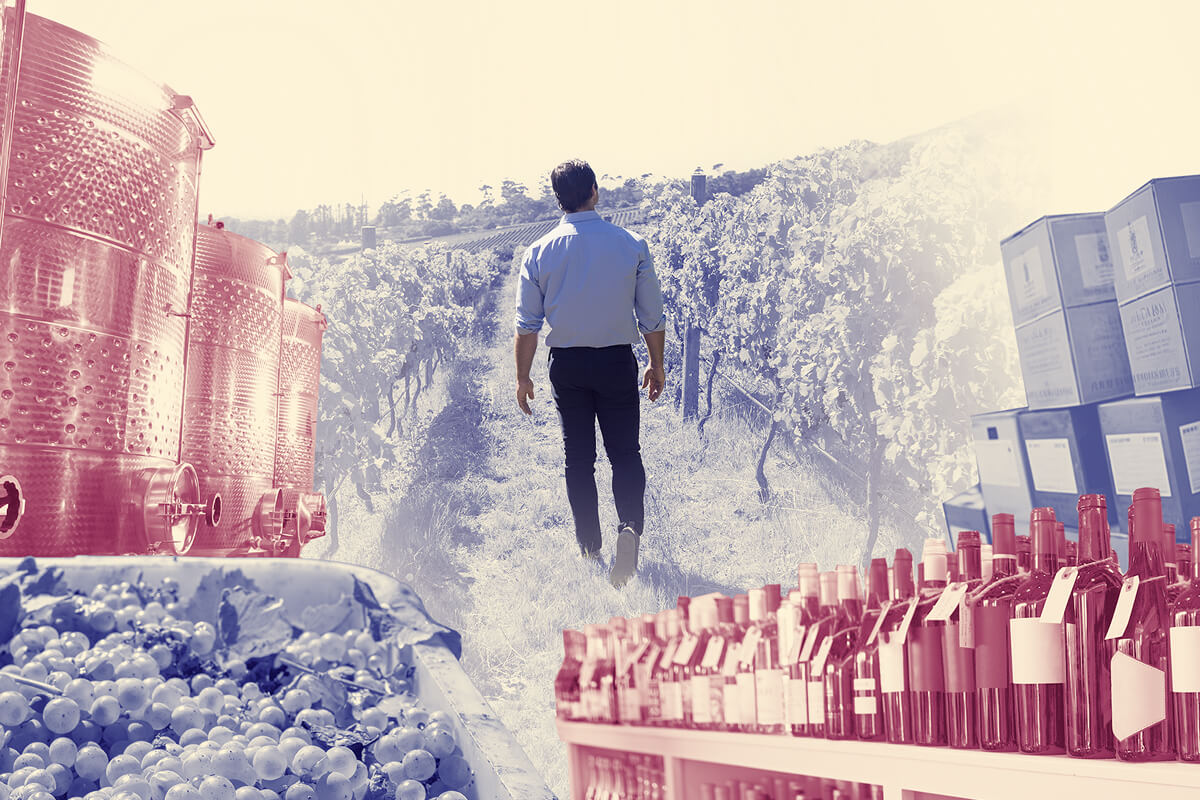
Definition and components of ESG
Environmental: The "E" in ESG focuses on a company's environmental impact and its efforts to address ecological challenges, including reducing carbon emissions, conserving natural resources, promoting biodiversity, and adopting eco-friendly practices throughout the supply chain.
Social: The "S" in ESG encompasses the social dimension, examining how a company interacts with its employees, customers, suppliers, and local communities. It includes fair labor practices, employee well-being, diversity and inclusion initiatives, community engagement, and contribution to social causes.
Governance: The "G" in ESG refers to the corporate governance practices that govern decision-making processes within a company. It involves transparency, accountability, board diversity, adherence to ethical standards, and shareholder rights.
Empowerment drives ESG reshaping of the wine industry
The wine industry and global markets are witnessing a profound transformation driven by new consumers, especially Gen Z and Millennials, prioritizing sustainability and ethics in their purchasing choices. The 2023 State of Wine Industry Report underlines the declining consumption among young drinkers aged 21-40, sparking inquiries into modern consumer expectations and their demand for products aligning with sustainability and social responsibility.
Beyond a buzzword to a mainstream movement
ESG's evolution from a mere buzzword to a prevailing movement is evident as younger consumers base their purchases on a company's ESG commitment. Brands wholeheartedly embracing these values and propelling positive change not only garner trust and loyalty but also passionate advocacy. It prompts us to ask: To what extent can a brand's ESG dedication amplify its influence? Can these principles genuinely reshape the consumer-brand relationship?
Conscious consumerism
Compelling research, highlighted by FMI, details Gen Z and Millennials' emphasis on ESG values, meticulously assessing ESG practices before buying and even willing to pay extra for products from ESG-committed businesses. This growing consumer awareness has led to a closer look at ESG principles throughout the supply chain, which includes sustainable sourcing of ingredients, environmentally friendly production methods, fair labor practices, and community involvement. By embracing ESG practices, businesses can appeal to these discerning consumers and create a more sustainable and robust supply chain.

Introducing an ESG-friendly supply chain model
An ESG-friendly supply chain prioritizes environmental conservation, social responsibility, and ethical governance. The industry can minimize its carbon footprint and reduce environmental impact by adopting sustainable practices at every production, distribution, and consumption stage. It involves organic and biodynamic farming, renewable energy sources, efficient packaging and distribution, and traceability to understand the social and ecological effects of wine choices. But what does this look like in practice? Let's explore the success stories of wineries that have embraced ESG-friendly measures and what the outcomes are.

Sustainability secrets of Crittenden winery
Crittenden Winery in Australia is leading the way in sustainable wine-growing practices, and its commitment to nature is second to none. They took home the prestigious International Sustainable Winegrowing Competition title in 2020 and continue to set the bar high for wine producers worldwide.
At the heart of Crittenden's sustainable practices lies their dedication to biological farming. Their secret weapon? Compost. This carefully managed blend of grape skins, stalks, hay, wood chips, and horse manure creates an ecosystem teeming with beneficial microorganisms that support the health and growth of their vineyards. Crittenden nurtures a thriving soil foundation that ensures exceptional grape quality by spreading the compost beneath the vines and cultivating inter-row green manure crops like oats, peas, and buckwheat.
Water conservation is a top priority for Crittenden. They have dramatically reduced water wastage through meticulous water usage and a cutting-edge recycled water system. Their wastewater treatment facility, meeting EPA standards, efficiently purifies winery wastewater, preserving this precious resource. The improved soil health due to their sustainable practices has also reduced their irrigation needs. What's remarkable is that their recycled water system provides pristine, high-quality water for the vineyards, gardens, and lawns.
Crittenden goes above and beyond by embracing renewable energy. They took a meaningful step towards sustainability by installing solar panels across their entire property in 2017. This move allows them to operate on clean solar energy and return surplus power to the grid, significantly reducing greenhouse gas emissions. They've even installed charging stations in their car park to prepare for the future of electric vehicles.
These exceptional efforts have yielded outstanding results. Crittenden's wines have won critical acclaim and numerous awards, showcasing the remarkable quality that arises from their sustainable and environmentally friendly practices. With their unwavering commitment to sustainability and their standing as a role model for the wine industry, Crittenden Winery exemplifies how responsible practices can safeguard their wines' ecological well-being and extraordinary quality.

Duckhorn’s ESG commitment and sustainable vineyard practices
Duckhorn goes above and beyond to embody its ESG values. With a holistic and responsible approach to sustainability, they are faithful stewards of the land, caring for their employees and communities and ensuring sound risk management practices. By making sustainable choices that consider environmental and social impacts, Duckhorn strives to create long-lasting value for all stakeholders.
Transparency and accountability lie at the heart of Duckhorn's ESG framework and oversight. Their management team and Board of Directors fully support their mission and have recently formalized their ESG strategy and reporting process, solidifying their commitment to these initiatives in the future. In addition, they are devoted to fostering an inclusive work environment through its Diversity and Inclusion (D&I) initiative. They prioritize respect and integrity among colleagues and have implemented anti-bullying policies and regular anti-harassment training to empower employees to express their opinions freely.
Regarding sustainability, Duckhorn sets the bar high with its vineyard practices. They have obtained certifications for several vineyards, including California Certified Organic Farmers (CCOF) and Certified California Sustainable Winegrowing (CCSW). Their approach to agriculture, which includes cover crops, compost application, and integrated pest management, promotes land health and minimizes environmental impact. From reducing herbicide and insecticide usage to preserving riparian zones and introducing beneficial insects, Duckhorn goes the extra mile to protect the environment and cultivate site-specific rootstock.
Duckhorn's remarkable alignment of values and actions showcases the profound significance of ESG principles in shaping a sustainable and thriving future. Their emphasis on diversity, environmental sustainability, and good governance sets a genuinely inspiring example for the wine industry and all sectors.

The power of ESG: why wineries should care

Appealing to the next generation of consumers
Capture the hearts and dollars of Gen Z and Millennials by embracing ESG values. These eco-conscious consumers crave brands that align with their beliefs and positively impact society and the environment. Wineries can become the responsible choice in the wine industry by adopting sustainability measures.

Gaining a competitive edge
ESG isn't just a buzzword—it's a critical factor in consumer decision-making. It presents a golden opportunity for wineries to stand out from their rivals. By embracing the movement, wineries can differentiate themselves in a crowded market and attract a loyal base of eco-friendly and socially responsible customers.

Improving brand image and customer loyalty
Committing to ESG can work positively for a winery's brand image. Trust and loyalty flourish when consumers see a brand as environmentally and socially responsible. Positive word-of-mouth among conscious consumers can solidify a winery's reputation and increase customer retention.

Saving costs and profitability in the long run
Investing in energy efficiency and waste reduction measures can lead to significant long-term cost savings. Wineries can slash operational expenses and enhance profitability by embracing renewable energy sources and adopting eco-friendly technologies. Moreover, sustainable practices future-proof businesses against regulatory changes and market shifts.

The path to becoming ESG-friendly

Embedding ESG into corporate culture and mission
The wine industry must make ESG an integral part of its corporate culture and mission. It calls for a mindset of responsibility towards the environment and society at all levels of the organization.

Conducting a comprehensive ESG assessment and setting measurable goals
A thorough ESG assessment is pivotal for understanding the current efforts in the supply chain. By setting clear and measurable ESG goals, the wine industry can track progress, pinpoint areas for improvement, market appropriately and ensure accountability.

Invest in renewable energy and eco-friendly technology
Transitioning to renewable energy sources, such as solar or wind power, can significantly reduce the wine industry's carbon footprint and overhead costs. Investing in eco-friendly production, packaging, and transportation technologies can further enhance sustainability efforts.

Collaborating with suppliers and partners for sustainable practices
ESG is a team effort. The wine industry should join forces with suppliers, distributors, and partners with similar ESG values. By uniting, stakeholders can drive positive change throughout the supply chain.

Engaging in transparent communication with consumers about ESG efforts
Openly communicating ESG initiatives with consumers is paramount. Brands should leverage digital platforms, social media, and packaging to inform customers about their ESG practices, progress, and future goals. Such transparency cultivates trust and forges stronger connections with eco-conscious consumers.
Eco-friendly strategy: balancing ESG and cost
The journey to sustainability through ESG practices begins with precision and strategic planning. An essential part of reducing waste, crafting what's needed, maintaining transparency and minimizing your carbon footprint is rooted in meticulous supply chain planning. The good news? Claret's Sales Collaboration feature offers a platform to achieve this while recognizing sustainability and cost-effectiveness as a common goal.
Conclusion
The wine industry is at a crossroads where ESG is becoming the new standard. Gen Z and Millennials, the drivers of change, seek brands prioritizing ESG practices – from vine to bottle. Wineries like Crittenden and Duckhorn have already recognized this shift and integrated ESG into their operations. By embracing this movement, wineries gain a competitive edge, boost brand appeal, attract eco-conscious consumers, and even cut costs. It's time for the industry to uncork the potential of ESG and pave the way to a conscious future.
Want to optimize your wine business for the eco-conscious consumer? Discover how Claret's supply chain planning modules can elevate your ESG practices today.
Frequently asked questions
What is the significance of ESG practices in the wine industry?
How does Claret's Sales Collaboration contribute to sustainability?
Can Sales Collaboration enhance supply chain efficiency?
How can wineries differentiate themselves using ESG practices?
Why is agile decision-making crucial in sustainable supply chain operations?

less time forecasting









